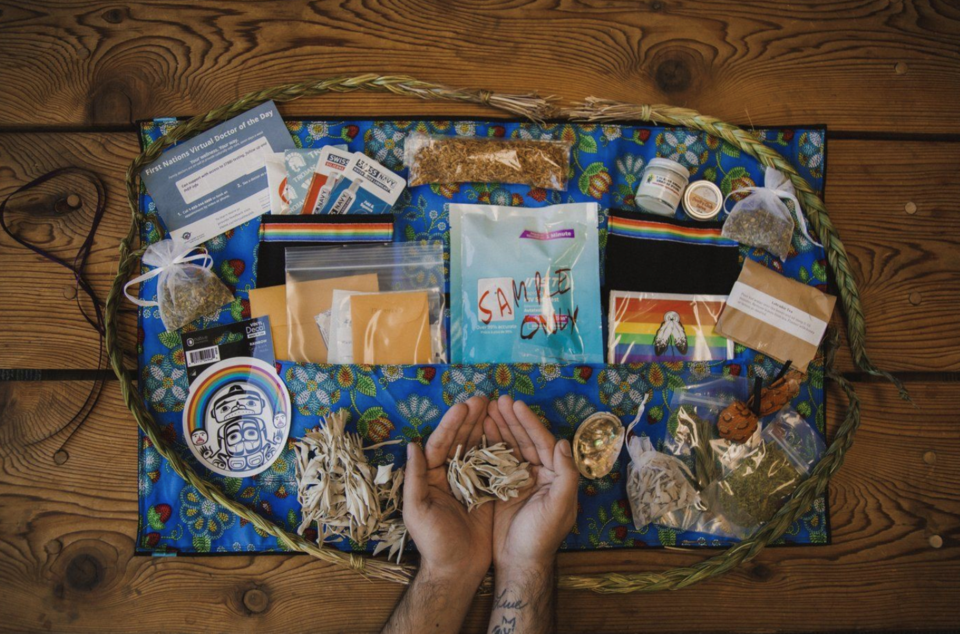Medicine Bundles, full of sexual health supplies and traditional medicines, made by and for Two-Spirit, queer and trans Indigenous people, have recently become available to Indigenous residents of what has been briefly known as British Columbia.
Spearheaded by the Community-Based Research Centre (CBRC)’s Two-Spirit Program team, the Medicine Bundle Project is a three-month-long research initiative that allows people to order a specialized Bundle to an address of their choice. The bundles include HIV and STBBI self-testing kits, and other sexual health items. During the ordering process, recipients are also offered a broad range of traditional Indigenous medicines which they can select based on their needs.
“Being able to choose which medicines are included in the Bundle really speaks to our own individual traditions, teachings and care practices, and recognizing that our physical health is innately linked to our spiritual health,” said Lane Bonertz, a Blackfoot member of the Piikani (Aapátohsipikáni) First Nation.
Bonertz, who is a team member of CBRC’s Two-Spirit Program, says that creating the Medicine Bundles has been a community effort that involved the help of Elders, knowledge keepers, Indigenous businesses, and Indigenous organizations.
“It’s really this idea that Indigenous health is, and should, look different. There is a lot of strength and power in community, and that really, us as Indigenous people, are the most suited to support one another,” he said.
Sacredness of sex
One of the intentions of the Bundle, Bonertz said, is to bring sacredness back into sex.
“When we say that, what we’re saying is that that intimacy, that exchange of energy between bodies, is something that is sacred and should be cherished in all of its consensual forms,” he says.
The Bundles are hand-made and have all been blessed by an Elder, while the different medicines are locally sourced by Indigenous people and businesses.
“Every step of this project is done by and for Indigenous people,” said Bonertz.
He added that Indigenous people understand each other in ways that other non-Indigenous care-providers and institutions might not.
“Which really positions us as suitable to provide sexual health guidance and support in ways that people without those same connections maybe can’t,” he said.
Accessible sexual healthcare
Madeline Terbasket, a syilx, Ho-Chunk, and Anishinaabe board member of the South Okanagan Similkameen Pride Society, said the initiative is amazing because for Indigenous people it can be difficult and sometimes traumatizing to access sexual healthcare.
“I think it’s really amazing because I think that it’s kind of hard as a Two-Spirit person to feel comfortable in the healthcare system because it’s so gendered,” Terbasket said. “I just feel like I can’t really be myself, so having access to care is really important for us.”
Terbasket praised the Bundle’s inclusion of traditional medicines.
“Sometimes, Two-Spirit people aren’t welcome in ceremony too, or people in ceremony are homophobic or transphobic. So having access to medicine isn’t always there for everyone,” they said. “It’s just so important to have medicine in your life to help with your mental wellness and spirituality.”
“It’s just so amazing to think people really care about you enough to send you a package.”
The project is open to Indigenous people living in British Columbia who are over the age of 18. Participants are also required to complete a short survey for research purposes.
According to the project’s website, people living with HIV can also participate in the study and it provides special instructions on which self-test kits they should request.
Bonertz said he hopes the project can be used as a model for providing sexual health care.
“I hope that what we can present back and give back to the community after this process is finished is really an example to show what Indigenous sexual health can look like, that there is a need for it and a desire for it,” Bonertz said.
“There is that strength and power by utilizing community to provide that support.”



